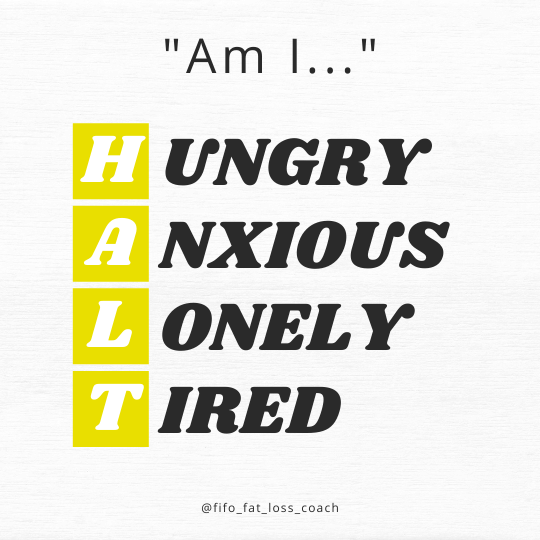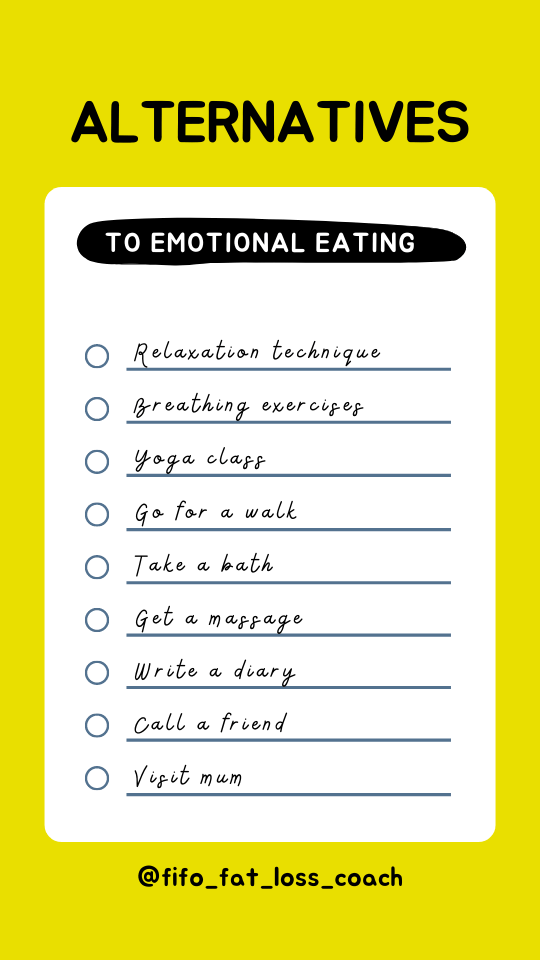Many people eat for comfort and to manage their emotions. We sometimes inadvertently use food to deal with unwanted physical feelings such as stress or anxiety. Emotional eating like this can get in the way of our fat loss goals. Below, we'll discuss a few strategies to tackle underlying issues associated with emotional eating.
More...
Why do people struggle with emotional eating and fat loss?
Food can seem like a great way to self-medicate. After all, it tastes good and can make us feel better. Albeit temporarily.
Often, it's the unhealthiest of foods that seem to taste the best. High fat, high sugar items - the cakes, cookies and chocolate bars. Yes, doughnuts, I'm looking at you too!
Generaly speaking, this 'emotional high' we can get from food is easily available and fully legal.
Food comforts and soothes us. It stimulates the pleasure pathways in our brain.
Likewise, food has emotional associations for many of us.
Emotional eating can cause us to eat more than we should, which is a problem when it comes to fat loss.
The food we eat has meaning and memory. It can remind us of home, of our childhood, or that time we went on holiday. To a foreign place, a foreign land with exciting flavours and cultures.
Perhaps our memories are linked with people - maybe our grandparents, or other loved ones.
Food connects us socially. It builds attachment with our families, our heritage and our culture. Often, food is the way we express our love, care or concern for others. Likewise, it's often heavily involved in celebrations and life's major milestones.
Food helps to preserve our own identity - our history and who we are.
Why is emotional eating a problem for fat loss?
On its own, using food as a comfort mechanism to make us feel better isn't a problem.
Almost everyone does it sometimes. It's normal and it makes sense, since it can stop us feeling bad.
However, the problems with emotional eating and fat loss arise when we:
Managing our feelings with food can become unhealthy and destructive.
Possible strategies to help overcome emotional eating
There are several tools we can use to wean us off the support mechanism of food.
In doing so, we can regain control and get back on track with our fat loss journey.
Keep a food diary and include a feelings journal
Food diaries are a great tool for fat loss, and making it an emotional eating journal can be even better.
Along with jotting down food types and portion sizes, take note of any thoughts and feelings you experience at meal time. Additionally, you may wish to track thoughts and feelings during times when you deliberately skip meals.
If recording your food intake makes you feel uncomfortable, perhaps you can start with just noting thoughts and feelings.
What emotions are you noticing when you sit down to eat? This can often be enough to pick up on clues and indicators. Often, it's not even necessary to note down exactly what you ate...or avoided.
After tracking your emotions in this way over a week, look over your journal to spot patterns. Do you notice any recurring themes or triggers that keep appearing?
In particular, look for links between particular situations and behaviours and the thoughts and feelings you experience.
HALT emotional eating and get back on track with fat loss
This is personally my preferred tool for tackling emotional issues. It's often used in mental health interventions for a wide range of concerns.

Basically, HALT is an acronym that stands for:
These 4 factors are powerful triggers for strong emotions in the human brain. Whenever you notice the urge to binge, or comfort eat, pause... no, HALT!
Just take a minute and ask yourself if you are actually feeling hungry? Or are you angry or anxious about something? Perhaps you're feeling lonely? Or maybe you're just tired.
Once you've identified the underlying emotion, then perhaps there might be a better way to deal with it.
If you're tired, go for a nap. If you're lonely - connect with a friend or family member. Put the SOCIAL back into social media. Physical activity and exercise can be a great outlet for feelings of anger and anxiety. Plus, let's face it - exercise is much better for fat loss than emotional eating.
At first, it can be difficult to recognise what you are thinking, feeling or experiencing. However, getting into the habit of checking in with your thoughts and emotions will make it easier.
Notice what is actually going on. That's the first step. Even if you don't change your behaviour immediately, at least you're on the right track.
Dealing with the discomfort instead of emotional eating
Once you are ready, willing and able to work on changing your emotional eating habit, here's the next step.
When you feel the urge to eat emotionally, stop and just take five minutes to sit with that urge.
You can even set a timer on your phone if you like.
During these 5 minutes, simply notice what you are thinking and feeling. Really focus on your thoughts and emotions. Whatever comes up, just sit with it. Notice and observe.
You will feel uncomfortable - you'll notice this!
But everything's okay.
After the five minutes have passed, you can make any choice that you feel comfortable with.
Over time, you'll learn to tolerate and even deal with the discomfort. Whereas before you were using food to comfort yourself, you're now working on soothing the emotions with your thoughts.
This can be a powerful action and help build confidence and faith in yourself that you can deal with this.
Alternatives to emotional eating which might help fat loss
Once you've identified what you're actually seeking from your emotional eating, you're better-equipped to come up with an alternative.
For example, what if you were simply looking to calm down, or to have fun, or to socially connect with someone else? Spend some time to come up with a list of alternatives you might be able to do instead.
Aiding fat loss, these alternatives to emotional eating might include:
Your list might only start with one or two options. That's ok, just try these alternatives when you notice impulses and urges.

If possible, even take note of how it went or what you noticed about the alternative experience.
By dealing with our feelings, we can curb the habit of emotional eating and in doing so help reduce our calorie intake which is an important factor in fat loss.

